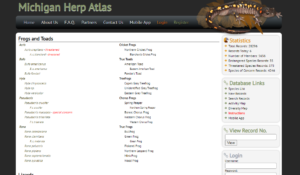Citizen Science Opportunity: Reptile and Amphibian Monitoring
The Michigan Department of Natural Resources (DNR) is encouraging anyone out and about this spring to report any sightings of frogs, toads, salamanders, snakes, turtles and lizards to their database. The data collected annually by citizens helps the DNR understand species abundance and distribution of reptiles and amphibians in Michigan, and assists the DNR in making conservation decisions that impact these species and their habitat.
According to DNR wildlife technician Amy Bleish in an April 6, 2021, DNR Press Release, “Reptiles and amphibians benefit from conservation work done by the DNR and partners, but we also need assistance from community scientists to track how their populations are doing. Your observations help provide that data.”
While enjoying the outdoors this spring, keep a special eye out for rare reptiles like the eastern massasauga rattlesnake and Blanding’s, wood, spotted and eastern box turtles. These species of special concern can be reported at Michigan.gov/EyesInTheField . Sightings of these species provide valuable insight into the health of the populations so that future conservation efforts can align with the needs of the species.
According to the DNR Wildlife Division, in addition to reporting your sightings of Michigan reptiles and amphibians, you can also support conservation efforts of these species through the Nongame Fish and Wildlife Fund .
To learn more about this great opportunity to get outdoors and become involved with citizen science, please review the press release HERE . The MDNR website also has an abundance of resources for learning how to identify Michigan’s reptiles and amphibians.

Screenshot of the Michigan Herp Atlas species webpage. According to the DNR press release on April 6, 2021, The Michigan Herp Atlas is a community science program administered in partnership with Herpetological Resource and Management to collect observational data on Michigan’s herpetofauna, or “herps.”
The post Citizen Science Opportunity: Reptile and Amphibian Monitoring appeared first on Michigan United Conservation Clubs.
Recent Posts



